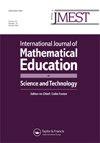在大学水平上学习数学:一项用于调查认识论信念内涵方面的连续队列研究
IF 0.6
Q3 EDUCATION & EDUCATIONAL RESEARCH
International Journal of Mathematical Education in Science and Technology
Pub Date : 2023-03-27
DOI:10.1080/0020739X.2023.2184281
引用次数: 0
摘要
在现代信息社会中,评估信息、数据或知识主张至关重要。由于这些活动受到认识论信念的影响,这些信念是教育的一个关键要素,因为教育机构打算为学生的职业和社会生活做好准备。因此,本研究旨在探讨学生在大学水平的数学学习过程中对数学认识论信念的发展。采用序贯队列研究方法,连续三年对1774名数学专业学生进行问卷调查。参与者以一种自发的方式对关于数学知识本质的主张进行评级——这是一种激发他们认识论信念内涵方面的研究过程。分析显示,学生对“数学是一门科学学科”和“数学是一门学校学科”持有不同的认识论信念——与未来的小学和初中教师相比,数学专业的学生和未来的高中教师认为“数学是一门学校学科”相对简单和肤浅。尽管如此,所有学生群体都认为“数学作为一门科学学科”比“数学作为一门学校学科”要复杂和深刻得多。有趣的是,无论学生的学习计划如何,特定领域的信念在学习过程中都保持相当稳定。本文章由计算机程序翻译,如有差异,请以英文原文为准。
Studying mathematics at university level: a sequential cohort study for investigating connotative aspects of epistemological beliefs
In modern information societies, evaluating information, data, or knowledge claims is crucial. As these activities are influenced by epistemological beliefs, such beliefs are a key element of education in the sense that educational institutions intend to prepare students for professional and social life. Hence, this study aims to examine the development of students' epistemological beliefs about mathematics in the course of studying mathematics at university level. In a sequential cohort study, 1774 responses of mathematics students were surveyed in three consecutive years. The participants rated claims about the nature of mathematical knowledge in a spontaneous manner - a research procedure stimulating their connotative aspects of epistemological beliefs. Analyses showed that students hold different epistemological beliefs regarding ‘mathematics as a scientific discipline’ and ‘mathematics as a school subject’ - with mathematics major students and future upper secondary school teachers rating ‘mathematics as a school subject’ to be relatively simple and superficial compared to future primary school and lower secondary school teachers. Nonetheless, all student groups find ‘mathematics as a scientific discipline’ to be significantly more complex and profound than ‘mathematics as a school subject’. Interestingly, the domain-specific beliefs remain rather stable in the course of studies regardless of the students’ study programme.
求助全文
通过发布文献求助,成功后即可免费获取论文全文。
去求助
来源期刊

International Journal of Mathematical Education in Science and Technology
EDUCATION & EDUCATIONAL RESEARCH-
CiteScore
3.30
自引率
11.10%
发文量
123
期刊介绍:
Mathematics is pervading every study and technique in our modern world, bringing ever more sharply into focus the responsibilities laid upon those whose task it is to teach it. Most prominent among these is the difficulty of presenting an interdisciplinary approach so that one professional group may benefit from the experience of others. The International Journal of Mathematical Education in Science and Technology provides a medium by which a wide range of experience in mathematical education can be presented, assimilated and eventually adapted to everyday needs in schools, colleges, polytechnics, universities, industry and commerce. Contributions will be welcomed from lecturers, teachers and users of mathematics at all levels on the contents of syllabuses and methods of presentation.
 求助内容:
求助内容: 应助结果提醒方式:
应助结果提醒方式:


